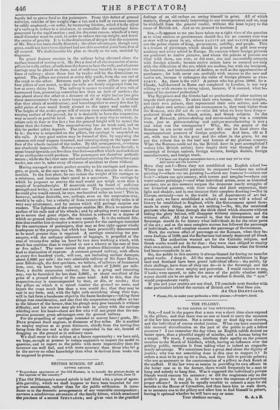BRITISH SCHOOL OF ART.
LETTER SECOND.
"To purchase specimens of the Old Masters, is to benefit the picture-dealer at the expense of the country." SescrAxondunell [Tits Old Dilettante's second epistle is half filled with a piece of agree- able garrulity, which we shall suppose to have been intended for our private amusement, rather than for the public edification. It intro- duces us to the domestic arrangements of our venerable correspondent ; narrates a mischievous adventure of the family kitten, which occasioned the purchase of a second SPECTATOR; and gives vent to the gratified
feelings of an old recluse on seeing himself in print. All of which matters, though extremely interesting to our correspondent and us, may be withheld from the general reader, without the least injury to the cause of British art. And so we proceed to business.] SIR,—It appears to me you have taken up a right view of the question as to what nations or governments should do ; for no country ever was or ever will be great in art, where NATIVE art and NATIVE genius are not the prime objects of king, government, nobility, and people. This is a truism of patronage, which should be printed in gold over every academy and every school in Europe. No country where foreign pictures are preferred to native pictures, and where the palaces of patrons are filled with them can ever, or did ever, rise and successfully compete with foreign schools; because native artists have to contend not only with the difficulties of the art, which are endless, but with the intrigues, the interests, and insinuations of dealers, as well as the apprehensions of purchasers ; for both never can cordially wish success to the new and native art, because it endangers the value of foreign pictures as mo. PERTY. Ay, there is the rub ! A patron who has given 5000/. for a Claude, half-doctored in Rome and completed in London, is not very willing to wish success to rising talent, because, if it succeed, what be. comes of his doctored perfection ?
The Egyptians and the Greeks had no productions of other nations WI impede their progress. To adorn their own houses, their own temples, and their own palaces, they represented their own actions, and em- ployed their own artists ; and the consequence is, they rank higher than the Romans, who did not do so—who did what we have been doing— preferred Greek works, Greek artists, and Greek subjects. In the time of HORACE, picture-dealing and statue-making was a complete trade, just as picture-making and antique-manufacturing is now ; and what was the consequence ? Why, Sir, the genius of the Romans in art never could and never did rear its head above the superincumbent pressure of foreign prejudice. And here, old as I am, with one foot in the gout and the other in the grave, let me pay the tribute due to the beef and bottom of my glorious country. What the Romans could not do, the British have in part accomplished ! —they (the British artists) have fought their way through all the contempt of foreign nations, foreign writers, foreign dealers, foreign manufacturers, and foreign trash.
"I'd have our English mounsiers know, a man may yet be wise And never are the Louvre."
Have they not P—Have they not established an English school ?•—• Where can our beautiful portraits be surpassed ?—where our animal painting ?—where our sea painting ?—where our humour ?—where our fruit ?—where our epic scenery, with towers and temples ?—where our water colour paintings ?—and what individual artists, even as historical painters, can at this moment surpass the desperate yearly struggles of our historical painters, with their colour and their expression, their light and shadow, and in one instance their complete drawing P—Not in Europe, certainly—not in the world. In all departments of art but HIGH ART, we have established a school ; and never will a school of history be established in England, while the Government spend thou.
i sands n every thing, and on art nothing I—No, Sir, the occasional geniuses who may blaze through the thick cloud which Obscures without hiding the glory behind, will disappear without Consequence, and die without effort. All that is wanted is, that the Government or the Sovereign should do for history what individuals do for the other parts of the art ; and as the most complete success has followed. the patronage of individuals, so will complete success the patronage of Government. Mark the curious effect of patronage on the Romans, when they be. came Italians of 1500, and the Barbarians had nearly destroyed all Greek works. The authorities wanted art for the Catholic religion, and Greek works would not do for that : they were then obliged to employ their ownartists, and the Romans, now Italians, became what the Greeks had been—standards in art.
Sir, the public in this country is always blamed for having no taste for grand works. I deny it. All the most successful exhibitions in Eng: land and Scotland have been grand individual efforts : the public, by their shillings, have dune all they can do—it is the Sovereign and the Government who must employ and patronize. I would venture to say, if books were opened, to take the sense of the public whether 4000/. a-year should not be set aside for art, or whether it should, the "ayes" would preponderate vastly. If you and your readers are not tired, I'll conclude next Sunday with some particulars behind the curtain of British art.* God bless you. AN OLD DILETTANTE.
* Please, Sir, to make your pothooks a little plainer.—Printer's


























 Previous page
Previous page